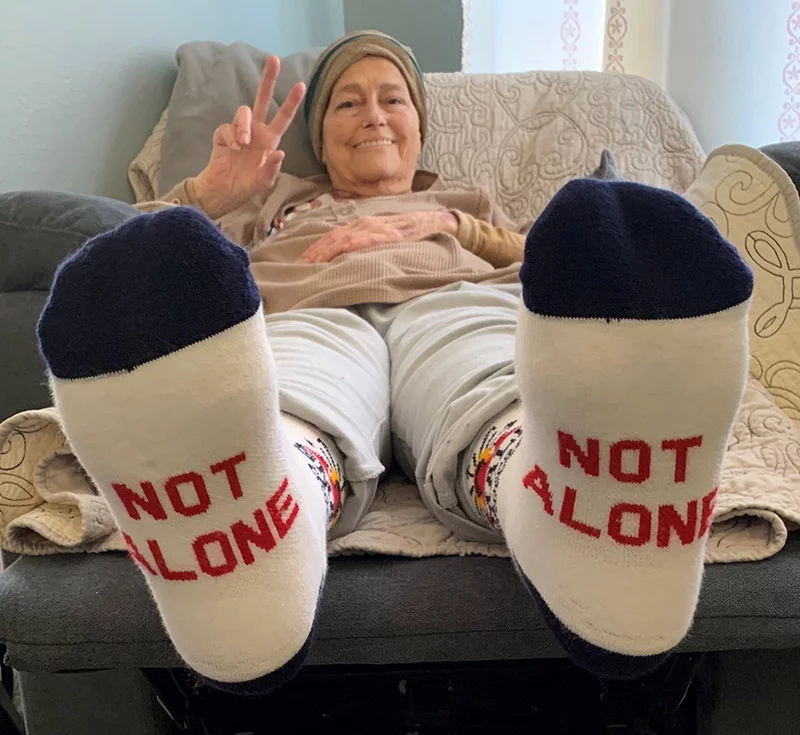
Giving treatment with a side of compassion, both on and off the clock
It’s Kate Poppert’s day off after working three 12-hour days in a row.
The cancer nurse and mother of four has a long grocery list, is drowning in laundry and couldn’t be happier.
That’s because Poppert chooses to do extra tasks on her days off including washing dirty laundry for patients who must stay in the hospital for a minimum of 30 days as they get bone marrow transplants.
How you can help
- Learn more about Small Choices
- Give money.
- Give time.
- Encourage children to create get-well cards for patients.
- Purchase items like grocery and restaurant gift cards, blankets, hand sanitizer, adult puzzles, lotion, soft Kleenex, games, adult puzzles and fuzzy socks with grips.
- Adopt a family during the holidays.
- Help with sewing projects.
“Things can be rough in the cancer world. We lose patients all too often,” said Poppert, who has worked at UCHealth University of Colorado Hospital for three years. “People think it’s crazy that I get involved during my free time. But, I’m not good at disconnecting. It feeds me to come home and continue to help patients.”
Poppert has been an oncology nurse for close to 20 years.
She traces her career choice to a formative experience when she was young along with inspiration from her mom, who still puts in hours as a nurse practitioner at age 73.
Poppert and friends survived a bad car accident after a school dance when she was 15. A driver blew through a stop sign and plowed into the car that a friend’s mom was driving.
Poppert spent weeks in the hospital recovering from a fused pelvis and other injuries and realized what a big difference a compassionate nurse can make. Then, she met her husband in college and learned that he had lost a brother to leukemia. Poppert earned a degree in biology, then became a registered nurse and has a special certification in bone marrow transplants.
She found her calling serving blood cancer patients.
Poppert always has done extra favors for patients and even spent several years working for nonprofits.
Four years ago, she used her acquired experience to start her own foundation called Small Choices.
The idea was to give patients and caregivers the opportunity to choose for themselves the kind of help that would best serve them during treatment.
“When people get these diagnoses, so many options get taken away. They can’t work. They can’t pick up kids at school. I didn’t want to just give people a bag full of stuff. I wanted them to choose what they needed,” Poppert said.
During the pandemic, the foundation — which Poppert runs entirely with the help of volunteers and donors — became a lifeline for patients who couldn’t have visitors.
Poppert and her co-workers and volunteers started providing isolation relief and survival kits.
Patients in need or those receiving treatment far from home could request weekly grocery deliveries, take-out orders and laundry services. Poppert and the foundation also provided “survival kits.” Patients could choose items that previous patients had found most helpful like extended charging cords, cozy blankets, noise blocking headphones, and crafts like dog toys to make if they were missing their furry friend at home.
“The patients were lonely and scared. We were able to walk in with bags full of love,” Poppert said.
Shirley McCray is one of the recipients of Poppert’s kindness.
McCray was diagnosed with leukemia a year ago and received a bone marrow transplant last summer. Since then, she’s been fighting infections and has had to return to the hospital for weeks at a time.
McCray turned 63 on Dec. 31 and had to spend both Christmas and her birthday in the hospital.
Poppert did her best to comfort McCray.
“She’s always so on top of it and so conscientious,” McCray said. “When you’re taking one step forward and two steps back, it’s pretty discouraging. I was really at a low point when she showed up one day with a teddy bear. It brightened my spirits so much. She has no idea how spot on her timing was. She does things from her heart.”

McCray is from Fountain. With family members living at least 100 miles away in southern Colorado, McCray said the clean laundry has been especially helpful.
“The laundry service is worth a million bucks,” McCray said. “Kate’s been a lifesaver.”
Doing laundry for patients may be one of Poppert’s most intimate acts of kindness. But it brings great joy both to both Poppert and her patients.
“Shirley always tears up when I walk in the room. She knows I’m there to help. You can feel so alone when you’re in the hospital for so long,” Poppert said. “I love bringing back fresh, clean clothes. It really is the small things that make a big difference.”
You Make Extraordinary Possible Together, we recognize and honor the qualities within ourselves by shining a spotlight on how each and every one of us improve lives in big ways and small.
